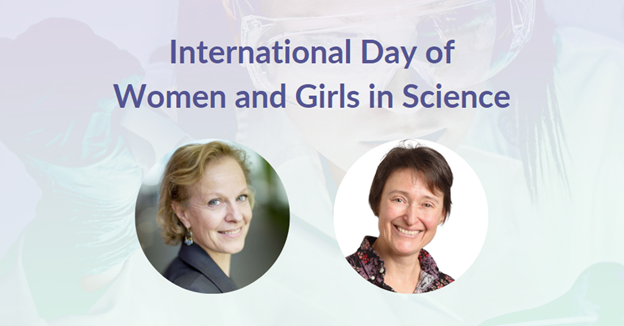
At ICR Consilium, we are celebrating all women and girls in science and are proud to be working alongside remarkable women in the industry every day. We asked two female CEOs on what International Day of Women and Girls in Science means to them.
Karine Rossignol, Chief Executive Officer, Smart Immune

“In the realm of science, a field where women make up approximately half of Europe’s workforce, their significant underrepresentation in leadership roles is a stark reality we must address. At Smart Immune, we’re challenging this status quo by proudly having women in pivotal leadership positions, a testament to our heritage, being founded by three women. International Day of Women and Girls in Science isn’t just a celebration of female role models but a call to action for setting concrete goals to empower women in the scientific community.”
As a female CEO in the biotech industry, I understand the vast potential that can be unlocked by increasing female representation in science. Our company, initiated by three female scientists, is developing a thymus-empowered T cell progenitor therapy platform to fully and rapidly re-arm the immune system against cancers and infections. This groundbreaking technology takes stem cells from healthy donors and rebuilds the T cell compartment in just three months, compared with the 18+ months following a stem cell transplant, showcasing the unique contributions from female scientists and necessity of diversity in driving scientific breakthroughs.
Despite the critical role of women in science, companies led by women remain the exception rather than the rule. This disparity highlights the importance of the International Day of Women and Girls in Science in advocating for gender equality in this field.
Diversity in science and healthcare goes beyond fairness; it’s a fundamental driver of innovation and creativity. Our world cannot afford to ignore 50% of the available intelligence on the planet, especially when it comes to improving our medicines and our healthcare. One major barrier to the advancement of women in science is the lack of visible role models. While we’ve seen progress, a disconnect persists between the number of women in junior roles and those advancing to senior positions. This gap is partly due to systemic bias, where women’s capabilities are often assessed based on past achievements, whereas men are evaluated on perceived potential.
On this International Day of Women and Girls in Science, I am filled with optimism. The growing emphasis on diversity and the successes of female-led initiatives in science are promising indicators. The journey towards equality is long, but with dedicated efforts and a commitment to mentorship and diversity, we can create a more inclusive and innovative scientific community. I am deeply convinced that this would not only create better career opportunities and more creative workplaces but that it will also benefit patients, the ones we passionately fight for at Smart Immune.
Beverley Carr, Chief Executive Officer, Amphista Therapeutics

The visibility of women in senior leadership positions and the support of female colleagues has been invaluable throughout my career, helping me navigate career decisions on the journey from lab scientist through business development to the role of interim CEO in biotech. This is why I’m proud that Amphista Therapeutics, a leader in next generation TPD, has a number of talented and intelligent women at all levels including in senior leadership positions such as Chief Scientific Officer and Vice President of Intellectual Property.
Creating a diverse and inclusive working environment where all employees feel valued, heard and seen is at the heart of Amphista’s culture but days like today, the UN-driven International Day of Women and Girls in Science, are an excellent reminder of the work that still needs to be done. Despite significant advances in the field, gender equality remains an issue that needs to be addressed. According to the BIO 2022 report on diversity in the biotech industry women represent only 34% of executive team members and only 20% of CEOs. This is despite the total numbers of employees being almost perfectly balanced at 49% female.
To overcome this, we must collectively seek to address the shortcomings of our industry and put in place clear steps to strengthen female representation at senior levels in the sector.
History has shown us that many of the greatest scientific advancements have arisen when the brightest minds have come together and as we continue to face a number of challenges globally, we must broaden the talent pool and ensure that women have a seat at the table. This will be critical for the future of scientific discovery.



